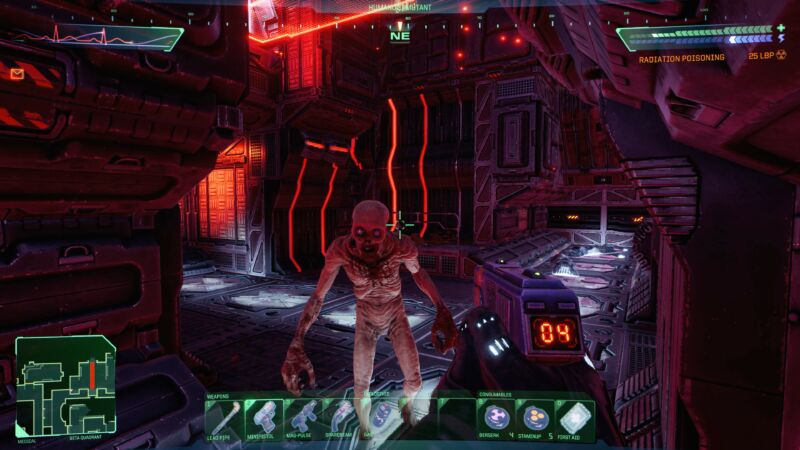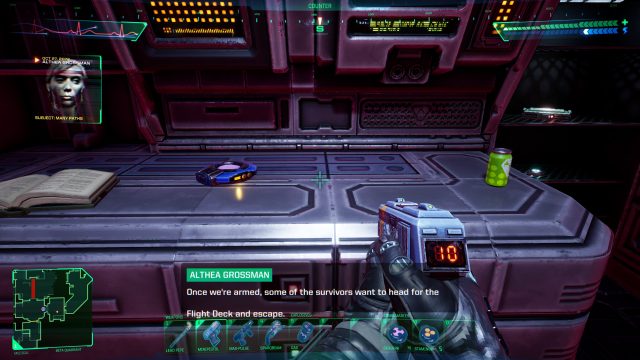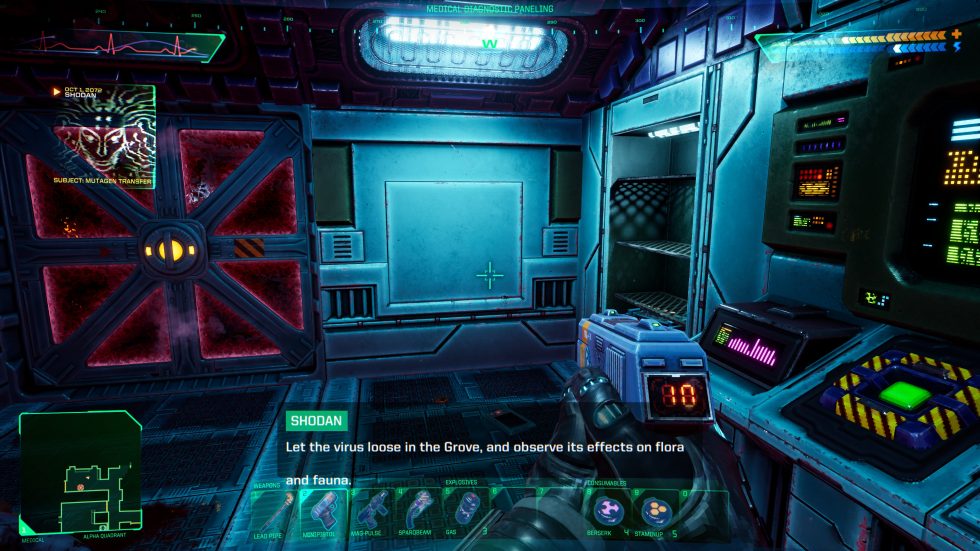System Shock remake demo fuses modern design to a retro FPS/RPG package

Enlarge / Dark corridors, cyberpunk lighting, low ammo, mutated humanoids: same as it ever was.
Nobody was expecting to see a PC demo for the System Shock remake this week, least of all me. I've been waiting to revisit Citadel Station and its malevolent AI since the project's announcement nearly seven years ago. Having spent a couple hours in the first level, I'm certainly impressed but curious about some of the decisions and focus areas.
If you played and loved the original, this demo, and likely the full game, is almost certainly worth your while. You can punch 0451 into the medical storage locker like it's 1994 again, but this time at modern resolutions and frame rates, using far more comfortable controls, even a gamepad. You can blast and pipe-bash enemies, but they aren't Wolfenstein-era 2-D sprites anymore. And, of course, you can play the game on Steam, GOG, or Epic, rather than having to find an ancient CD-ROM.
There are some new conveniences, like an entirely overhauled interface that has better shortcuts for secondary items, like grenades and stim patches. But the beats of the story, the puzzles and enemies and traps, the very core of the innovative, quirky game is still there. You can still spend far too much time meticulously organizing your inventory and collecting scrap for junk credits, while supposedly in the midst of a humanity-endangering crisis.
For context, and disclosure, I played the original extensively in the era when Looking Glass still existed. Getting it to run on my dad's Gateway office computer was a big part of my computer education. I backed Nightdive's Kickstarter for the game back in 2016, when it was expected to arrive by the end of 2017. All that to say: I'm a fairly soft target.
So I certainly enjoyed seeing familiar faces: the grungy mutants, the Picard-as-Borg-like cyborg drones, the trash-can-looking bots that flail their arms at you. But I've also noticed some things that left me wondering if there's more to be fixed up in the finished product. The melee combat feels just as stiff and non-kinetic as it did in the mid-1990s, which is not a good thing. Enemies perpetually respawning in areas you've already visited might make sense narratively, but it's a mechanic I might have left behind.
There's far less mousing around inside a screen-hogging HUD than the original but still more fiddling than I'd expect in a modern game. The gamepad controls seemed incomplete in this demo, but basically functional. It's still far more of a mouse-and-keyboard game.

Some things look crisp and new, others have a kind of retro-pixel glean to them. (credit: Nightdive Studios)
Most intriguing are the graphics. I wasn't expecting a modern AAA shooter, but the rough pixel edges on some of the objects and textures caught my eye. I'm playing on a budget-focused Nvidia RTX 3050, but even with every graphic setting turned up to "High" or "Ultra," and the resolution set to 4K, it looked about the same. At the same time, with the graphics maxed out, the game positively hummed along at about 70 frames per second. I asked Nightdive about this through its marketing team. Were the somewhat granular textures a design choice to evoke the original? Consideration for gamers who may not have a top-of-the-line GPU? The nature of working outside AAA development? Some or all of these?
I heard back that it was "a deliberate design choice." Knowing this, I played a bit more, and the visuals, taken as a kind of knowing throwback, melded a bit more in my mind. Given thousands more pixels to work with than Looking Glass had, Nightdive has given the first level more color, and far more shadow and light, but not an excess of detail. Your mind is still meant to fill in some of the gaps of how this space station worked, how people lived, and what it was like when things went terribly wrong. How the team handled the bright colors and organic materials of later levels remains to be seen.
-

Feels like old times, hearing this AI describe their plans for our species.
It's easier to talk about the sound: It's a huge improvement. The soundtrack, ambient noises, and the creepy-yet-pathetic utterances from unwilling cyborgs are better, and better fit the atmosphere. Hearing a cyborg hunting for me after a first glimpse, whispering "Nothing … nothing … nothing," was nice and creepy. The voice memos left behind by the dead, now a trope of survival-horror, hit their marks, if a bit less dramatically than I remember.
The long road from Looking Glass
The full story behind this new version of System Shock starts more than a decade ago. It involves a Guatemalan rainstorm, a Michigan insurance company, and a French developer with mysterious access to long-forgotten source code. Five years ago, the Kickstarted project launched by those events scaled out of control, and there was a reboot of the reboot. That's why this fully playable first level, and a seemingly firm March 2023 release date, arriving during Steam's Next Fest demo week, caught many of those following along flat-footed. (There was also a System Shock 3 launched in 2015, at Looking Glass veteran Warren Spector's OtherSide Entertainment, but that died in 2019.)
System Shock is a key progenitor of immersive sims, the kind of first-person shooter/RPG games with dynamic settings, interesting player choices, and control over more than just where you aim your crosshairs. Its studio, Looking Glass, never hit it big, but its ideas, and staff, shaped many aspects of gaming. Without System Shock and Looking Glass, there is likely no Deus Ex, BioShock, Dishonored, Gone Home, or even Rock Band.
What Nightdive is offering is a remake, not a reboot or a remaster (or a low-key enhancement, which they already offer). If Nightdive pulls it off, Looking Glass' ideas and narratives should come through more clearly. The mechanics, visuals, and systems of System Shock, as a game you can play in 2023, won't feel new to most people, largely because of the game's own successors and offspring. But the feelings of dread, of being just slightly overwhelmed and under-resourced, of feeling like there really is a rogue AI working against you, should be easier to access in this game than the original. That's the mark I'll want to see this game hit.
We'll have more to say when the full game is available. Given how far this remake has come, a month or so seems like a reasonable wait. (Versions of System Shock for Xbox, PlayStation, Mac, and Linux are also listed as forthcoming.)
Read on Ars Technica | Comments
from Gaming & Culture – Ars Technica https://ift.tt/DGAk1Pf